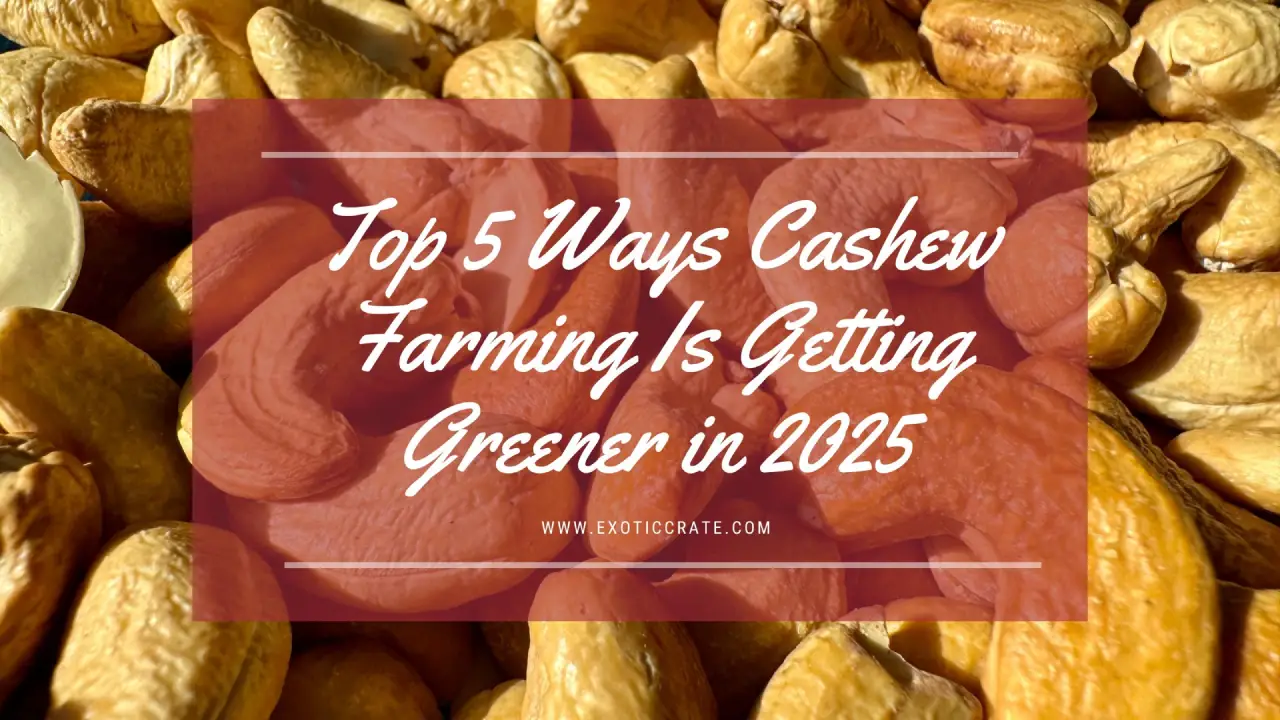Introduction
In the world of agriculture, sustainability is no longer optional — it’s essential. Cashew suppliers across the globe are embracing new methods to produce better yields while reducing their environmental impact. As the demand for ethically grown, eco-friendly nuts continues to rise, the pressure is on the cashew industry to green every step — from farm to fork.
At Exotic Crate, we’ve partnered with progressive cashew farmers who are leading the shift toward more sustainable practices. Here’s a look at the top 5 ways cashew farming is going greener in 2025, and how these changes are redefining what it means to be a responsible cashew supplier.
1. Regenerative Farming Practices Are Taking Root
Traditional farming often depletes soil, but in 2025, many cashew growers are switching to regenerative agriculture — a method that restores soil health, increases biodiversity, and captures carbon from the atmosphere.
What’s Changing:
- Cover cropping: Farmers grow legumes between cashew rows to fix nitrogen naturally.
- Biochar use: Organic carbon-rich material is added to soil to retain nutrients and moisture.
- Zero-till practices: Reducing soil disturbance to preserve its microbial ecosystem.
For cashew suppliers like Exotic Crate, working with regenerative farms ensures long-term yield consistency, improved cashew kernel quality, and a significantly lower environmental footprint.
Regenerative practices can increase yield by up to 15% while improving soil health over time.
2. Water Conservation Through Drip Irrigation and Rain Harvesting
Water scarcity is a major issue for cashew farming, especially in India and West Africa. To combat this, farmers are deploying drip irrigation systems, which deliver precise amounts of water directly to the root zone.
Key Strategies:
- Drip lines reduce water usage by up to 60% compared to flood irrigation.
- Rainwater harvesting ponds are being built to store and reuse monsoon water.
- Moisture sensors now help automate watering schedules based on real-time soil data.
Cashew suppliers focused on sustainability — like Exotic Crate — are encouraging farmers to install these systems by offering training, incentives, and subsidies.
One hectare of cashew land using drip irrigation can save over 300,000 liters of water annually.
3. Organic Fertilizers and Natural Pest Management
As consumers become more cautious about chemical residues in food, cashew farmers are ditching synthetic fertilizers and pesticides in favor of natural alternatives.
What’s Trending:
- Compost and vermicompost made from cashew shell waste
- Neem oil sprays to deter insects and fungal infections
- Pheromone traps for pest population monitoring
- Intercropping with herbs like lemongrass or marigold to repel pests naturally
Exotic Crate works closely with certified organic farmers to ensure that every nut is grown without the use of harmful chemicals — a win for health, taste, and the planet.
Cashew kernels grown organically have been shown to contain 30–40% more antioxidants.
4. Solar-Powered Processing and Cold Storage
Going green isn’t limited to farms — it extends into post-harvest processing and supply chain logistics. In 2025, more cashew processing units are adopting solar-powered systems to reduce reliance on fossil fuels.
Innovations Include:
- Solar dryers for moisture removal after shelling
- Solar cold storage units to preserve nut freshness before export
- Biomass boilers powered by cashew shell waste for roasting and steaming
Cashew suppliers investing in solar infrastructure are not only saving costs but also significantly reducing their carbon emissions — a key selling point for eco-conscious buyers.
Solar-powered processing can cut emissions by up to 70% and reduce electricity bills by 60%.
5. Fair Trade Certifications and Traceable Supply Chains
Being “green” also includes treating people fairly. Cashew suppliers in 2025 are more transparent than ever about where their cashews come from, who grows them, and under what conditions.
The Green Shift:
- Fair Trade certification ensures ethical labor and fair wages
- Digital traceability tools (like QR codes) allow consumers to trace their cashews back to the exact farm
- Farmer training programs help smallholders adopt sustainable techniques
Exotic Crate proudly works with cooperatives in India that are both Fair Trade and Rainforest Alliance certified. Our cashews come with full farm-to-pack traceability — something that wholesale buyers, food brands, and retailers increasingly demand.
Traceable cashew supply chains are now preferred by 80% of global importers.
Conclusion: Green Is the Future of Cashew Supply
Cashew farming in 2025 is smarter, cleaner, and more responsible than ever before. From regenerative soil management to solar-powered factories and ethical trade practices, the green revolution is here — and it’s reshaping the industry.
For cashew suppliers like Exotic Crate, going green is not a trend — it’s a long-term commitment. By partnering with eco-conscious farmers, using clean energy, and offering traceability, we’re delivering not just premium cashews — but a better world with every bite.



